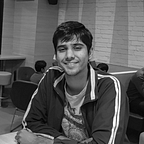Why do I lack motivation? Every student either in college or school might have wondered about this at least once in their lives.
Around a year ago, when I was in college, I read “The Motivation Myth” by Jeff Haden, a book which debunks most popular myths about motivation and achieving a goal. Well, here I’ll be sharing some interesting pointers and tips which I found to be effective in practice.
Before you get started here’s the nitty-gritty of this whole article.
- Motivation isn’t the spark
- Success is directly proportional to Progress not Goals
- You don’t need a Coach, You need a Pro
- Become a Jack of all Trades
Let’s begin
Motivation isn’t the Spark
The psychology definition is “Motivation is the process that initiates, guides, and maintains goal-oriented”. Motivation helps us to embark the journey with a Goal but that’s it. Rest of the process to achieve that goal lies upon us. It is kind of a what dopamine rush is. Temporary.
There’s only one recipe, according to author, for gaining the motivation to do what you want to do. It is Success. Jeff Haden describes this theory called The Self-reinforcing loop of Success. What it essentially means is that when you start taking action and successfully achieve the target, it creates the motivation to do another task or goal. Specifically, the dopamine it we get when we observe ourselves making progress.
Action → Success → Motivation → Action
This creates positive dopamine driven success loop.
Best instance to implement is to get started with a small goal. With the small triumph you could get an head start.
Success is directly proportional to Process not Goals
You might already know this. “Love the Process” and all the fancy quotes. But author takes up a little quirky, interesting approach to explain this phenomenon. It is that once you set a goal, forget completely about it and focus only on the process. For instance you decided to decided to lose 5 kilos in a month. You start by completely forgetting about the goal to thinking and telling yourself that you are a healthy person. Being a healthy person little by little you improve your eating style, reducing carbs, increase healthy food intake and start exercising.
Instead of feeling the anxiety after setting the goal, you totally forget about it and start scheduling the sub-task through out a timeline. Rework, revamp and adapt as you go till you reach the final sub-task. Once you are done with the whole timeline you might have already achieved the goal.
The exact plan for losing weight suggested by author looks like this.
A bonus tip to aid the process use power of Language. Instead of telling I CAN’T use I DON’T. Because using the word Can’t implies a dependent external factor. But using the word Don’t implies your internal identity. Seem silly but notable.
Example: I can’t drink vs I don’t drink.
Become a Jack of all Trades
Be a Generalist rather that specialist.
Be an ‘AND’ person
Like being Doctor and YouTuber and Podcaster. Instead of specialising in one particular field, if you try to explore other options which interests you, it increase the surface area for serendipity to strike. The probability of stumbling across new opportunities increases progressively.
You can deep dive about this in a book called ‘Range: Why Generalists Triumph in a Specialized World’
Let’s dive into some theory author suggests and do some math. It is known fact that one can become an expert at any skill (Either Profession or Hobby) in 5–7 years. Think of Life in 5–7 years segments.
If you are 20, that means you could become really good up-to 7–10 different things. Professionally it means that you is not necessarily restricted to single career. If you think about it, the significance of ‘loving the process’ theory doesn’t sound silly and banal.
You don’t need a Coach, You need a Pro
We all know the importance of Learning and how it’s a never ending process etc. One way or another everything we learn is a form of skill. If you learn a particular skill from a coach, the chances are you might become what they want you to be. It requires some energy from your end. Alternatively, if you decide to connect with a person who is Pro at that skill and by picking his mind you will start becoming like him/her sooner or later because the energy for your improvement comes from both the ends.
For instance, Consider learning Data Science. It is good to learn it by attending classes, referring online etc. However, if you connect with a Data Scientist from say a big MNC and if he accepts you as a mentee, you are more likely excel at that skill. I’m not opposing pedagogy, it’s just that the Pros outweigh the Cons.
When I started reading this book, I wasn’t particularly in my ‘peak productive shape’ (Is that even a thing?). However, reading the stories and examples from this book sort of gave me a gist of how Productivity plays crucial role in every phase of our lives and helped me getting started with it. This in turn made me a Productivity Grease monkey.
Note: Here I have summarised some important points from the book in student’s perspective which I felt were effective in practice.
